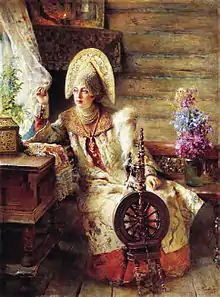жена
Bulgarian
Etymology
Inherited from Old Church Slavonic жена (žena), from Proto-Slavic *žena, from Proto-Balto-Slavic *génāˀ, from Proto-Indo-European *gʷḗn.
Pronunciation
- IPA(key): [ʒeˈna]
Usage notes
- The vocative жено (ženo) is considered vulgar and is therefore generally avoided.
Declension
References
- жена in Rečnik na bǎlgarskija ezik (Institut za bǎlgarski ezik)
- жена in Rečnik na bǎlgarskija ezik (Čitanka.Info)
- Georgiev V. I., editor (1971), “жена”, in Български етимологичен речник [Bulgarian Etymological Dictionary] (in Bulgarian), volume 1, Sofia: Bulgarian Academy of Sciences, page 536
Macedonian
Etymology
From Proto-Slavic *žena, from Proto-Balto-Slavic *génāˀ, from Proto-Indo-European *gʷḗn.
Pronunciation
- IPA(key): [ˈʒɛna]
Audio (file) - Hyphenation: же‧на
Noun
жена • (žena) f (plural жени, related adjective женски, diminutive женичка or женче, augmentative жениште or женетина)
Declension
Antonyms
- маж m (maž)
Derived terms
- едноженство n (ednoženstvo)
- жени impf (ženi)
- женидба f (ženidba)
- женица f (ženica)
- женичка f (ženička)
- жениште n (ženište)
- женка f (ženka)
- женкар m (ženkar)
- женкарство n (ženkarstvo)
- женска f (ženska)
- женскар m (ženskar)
- женски (ženski)
- женско n (žensko)
- женсковина f (ženskovina)
- женскост f (ženskost)
- женскотија f (ženskotija)
- женствен (ženstven)
- женственост f (ženstvenost)
- женче n (ženče)
- женчуле n (ženčule)
- женчуленце n (ženčulence)
- многуженство n (mnoguženstvo)
- ожени pf (oženi)
- прежени pf (preženi)
- преженува impf (preženuva)
- прожени pf (proženi)
- се жени impf (se ženi)
- се ожени pf (se oženi)
- се прежени pf (se preženi)
- се преженува impf (se preženuva)
- се прожени pf (se proženi)
Old Church Slavonic
Alternative forms
- Glagolitic: ⰶⰵⱀⰰ (žena)
Etymology
From Proto-Slavic *žena, from Proto-Balto-Slavic *génāˀ, from Proto-Indo-European *gʷḗn.
Declension
| Case | Singular | Dual | Plural |
|---|---|---|---|
| Nominative | жена žena |
женѣ ženě |
женꙑ ženy |
| Accusative | женѫ ženǫ |
женѣ ženě |
женꙑ ženy |
| Genitive | женꙑ ženy |
женоу ženu |
женъ ženŭ |
| Locative | женѣ ženě |
женоу ženu |
женахъ ženaxŭ |
| Dative | женѣ ženě |
женама ženama |
женамъ ženamŭ |
| Instrumental | женоѭ ženojǫ |
женама ženama |
женами ženami |
| Vocative | жено ženo |
женѣ ženě |
женꙑ ženy |
See also
| отьчьство (otĭčĭstvo, “family”) | Male | Female |
|---|---|---|
| parent родител҄ь (roditelʹĭ) |
отьць (otĭcĭ), авва (avva, “father”) | мати (mati, “mother”) |
| sibling | братръ (bratrŭ, “brother”) | сестра (sestra, “sister”) |
| child | сꙑнъ (synŭ, “son”) | дъщи (dŭšti, “daughter”) |
| grandparent | дѣдъ (dědŭ, “grandfather”) | баба (baba, “grandmother”) |
| grandchild | въноукъ (vŭnukŭ, “grandson”) | – (“granddaughter”) |
| great-grandparent | прѣдѣдъ (prědědŭ, “great-grandfather”) | – (“great-grandmother”) |
| mother's sibling | оуи (ui, “maternal uncle”) | – (“maternal aunt”) |
| sibling's child | братанъ (bratanŭ), сꙑновь (synovĭ), сꙑновьць (synovĭcĭ, “nephew”) | братана (bratana, “niece”) |
| cousin | братоучѧдъ (bratučędŭ, “male cousin”) | братоучѧда (bratučęda, “female cousin”) |
| spouse | мѫжь (mǫžĭ), чрьтожьникъ (črĭtožĭnikŭ), малъженъ (malŭženŭ, “husband”) | жена (žena), чрьтожьница (črĭtožĭnica), съложь (sŭložĭ, “wife”) |
| parent of wife | тьсть (tĭstĭ, “father-in-law (wife's father)”) | тьща (tĭšta, “mother-in-law (wife's mother)”) |
| parent of husband | свекръ (svekrŭ, “father-in-law (husband's father)”) | свекрꙑ (svekry, “mother-in-law (husband's father)”) |
| spouse of child | зѧть (zętĭ, “son-in-law (daughter's husband)”) | снъха (snŭxa, “daughter-in-law (son's wife)”) |
| spouse of husband's brother | – | етрꙑ (etry), кѫпетра (kǫpetra, “sister-in-law (husband's brother's wife)”) |
| stepchild | пасторъкъ (pastorŭkŭ, “stepson”) | – (“stepdaughter”) |
Old East Slavic

Etymology
From Proto-Slavic *žena.
Pronunciation
Declension
| Singular | Dual | Plural | |
|---|---|---|---|
| Nominative | жена žena |
женѣ ženě |
женꙑ ženy |
| Genitive | женꙑ ženy |
жену ženu |
женъ ženŭ |
| Dative | женѣ ženě |
женама ženama |
женамъ ženamŭ |
| Accusative | женѫ ženǫ |
женѣ ženě |
женꙑ ženy |
| Instrumental | женоѭ ženojǫ |
женама ženama |
женами ženami |
| Locative | женѣ ženě |
жену ženu |
женахъ ženaxŭ |
| Vocative | жено ženo |
женѣ ženě |
женꙑ ženy |
Descendants
References
- Sreznevsky, Izmail I. (1893), “жена”, in Матеріалы для Словаря древне-русскаго языка по письменнымъ памятникамъ [Materials for the Dictionary of the Old East Slavic Language Based on Written Monuments] (in Russian), volume 1 (А – К), Saint Petersburg: Department of Russian Language and Literature of the Imperial Academy of Sciences, column 857
Russian
Etymology
Inherited from Old East Slavic жена (žena), from Proto-Slavic *žena, from Proto-Balto-Slavic *génāˀ, from Proto-Indo-European *gʷḗn, whence English queen and gyno-.
Pronunciation
- IPA(key): [ʐɨˈna]
Audio (file) - Rhymes: -a
Noun
жена́ • (žená) f anim (genitive жены́, nominative plural жёны, genitive plural жён, diminutive жёнушка or жену́ля or жену́лька)
Declension
Rusyn
Etymology
From Proto-Slavic *žena, from Proto-Balto-Slavic *génāˀ, from Proto-Indo-European *gʷḗn.
Noun
жена • (žena)
- woman
- Ту грає єдна жена і єден хлоп
- Tu hraje jedna žena i jeden xlop
- Here plays one woman and one man
Serbo-Croatian
Etymology
From Proto-Slavic *žena, from Proto-Balto-Slavic *génāˀ, from Proto-Indo-European *gʷḗn.
Pronunciation
- IPA(key): /ʒěna/
- Hyphenation: же‧на
Declension
References
- “жена” in Hrvatski jezični portal